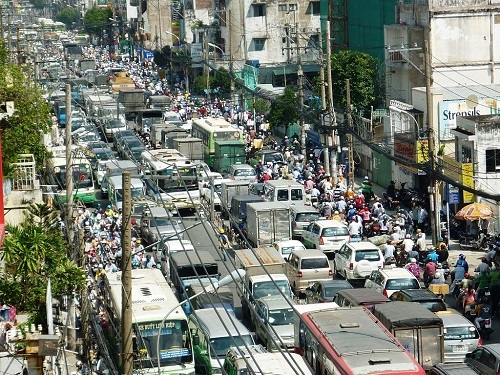Stanford Knowledge Integration Laboratory (SKIL)
Resulting World View
What the SKIL model reveals about the human experiment and the behavior that keeps it on track, is that we have to find and implement the rate of population decline that diminishes the total human footprint far below the carrying capacity while allowing a high enough rising per capita wellbeing to limit social conflict.

Traffic congestion in Ho Chi Minh City, Vietnam
By Ngô Trung - Own work, CC BY 3.0,
Wikimedia
Unwinding the Human Predicament: Summary and Conclusion
In the previous section I described how two hermits could come to the conclusion that adding a mutual constraint would provide each with some benefits. The constraint was obvious and immediate. And the benefit was obvious and immediate.
So the conversation between the two hermits was simple.
However, the conversations for the case of additions to the social contract that produce civilization sustainability are not simple. The constrains outlined in part 4 and the imagined future benefits are not simple.
The one-on-one conversations between two people, one an advocate for the new constraints and benefits, and the other blind to any future injury on the present path are not simple. However they may be not too complex for these conversations to succeed.
Similar complexity did not prevented abolition, suffrage, prohibition, and civil right from being added to our social contract. Their adoption started with simple one on one conversations. It took time for a constituency to grow large enough; first to create social pressure for change, and eventually to create enough institutional coercion to implement them.
The "Change the Course" project at SKIL plans to understand and help implement these one on one conversations. By initiating and dissecting many trial conversations among many pairs of individuals we hope to determine the form and content of making the blind listener into an informed advocate.
This 10 minute video. invites you to participate in the "Change the Course" -- a project to identify the form and content of these conversations.